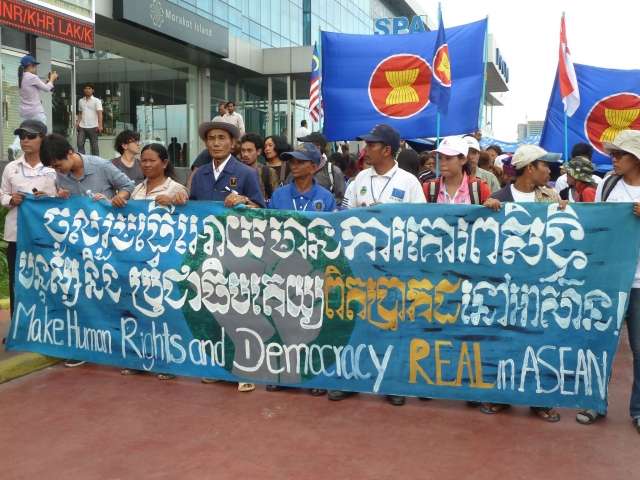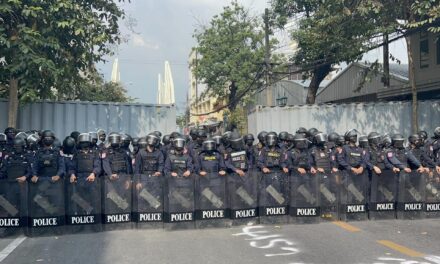By Shalmali Guttal, 11 December 2012
Make human rights and democracy real in ASEAN.
This was the simple yet powerful message from the ASEAN Grassroots People’s Assembly (AGPA), held November 13 to 16 In Phnom Penh and attended by about 4000 Cambodians and another 200 people from other ASEAN countries.
AGPA was organised by a voluntary group of activists from cross-sector networks in Cambodia with the support of several regional and international organizations across the Asian region. AGPA was the first of its kind in Cambodia. Grassroots activists and allies from diverse constituencies of workers, youth, farmers, fishers, indigenous peoples, sex-workers, civil servants, lesbian-gays-bisexuals-transgenders, representing and advocating diverse issues, such as river-basin protection, land and forest protection, women’s rights, human rights, etc. came together to analyze the forces shaping Cambodia and the Southeast Asian region, and share their struggles and strategies.
Cambodian authorities’ negative reaction had been evident well before the events started. They had blocked booking of meeting venues and delayed issuing permits for public events. AGPA opened on November 13 against tremendous odds. The owner of the venue for the opening ceremony said that the municipality would shut down his restaurant if he allowed the event to go ahead—so he cut off the electricity. But that did not deter the 2000 Cambodians and regional friends who gathered; using megaphones, the AGPA was launched in a festive spirit of traditional dances, activist songs and solidarity messages.
Authorities similarly tried to block the workshops scheduled on November 14 but were only successful in shutting down the workshop on labor issues. However, on the instructions of the police, the owners of several guesthouses evicted many Cambodian AGPA participants. The AGPA assembly on November 15 was held in a public park in the heart of Cambodia’s business district. Against the backdrop of buildings that housed private banks and corporate offices, at least a thousand people sat on the ground all day and listened to moving testimonies from Cambodians about the challenges they face in their daily lives and their attempts to organize, mobilise and defend their rights. Regional allies from the Southeast Asian region similarly shared their experiences and solidarity messages.
AGPA closed magnificently on November 16 with a march of about 2500 people, who went to the National Assembly to present the AGPA statement to Cambodian parliamentarians. The marchers were not deterred by threats of arrest and legal action by the authorities; displaying colorful banners with sharp and hard hitting political messages, the marchers waited patiently outside the National Assembly until the Parliamentarians agreed to accept the AGPA statement. The mood was festive and full of hope, and spirits were kept high by the Messenger Band, who went up and down the line of marchers, singing songs of struggle and encouraging people to sing along with them.
As it has envisioned, AGPA has expanded the space for Cambodian struggles as no other process has done for several years. It has sparked ideas for future mobilizations and actions aimed to restore, secure and defend peoples’ rights.
The AGPA statement can be found at http://focusweb.org/content/asean-grassroots-peoples-assembly-peoples-statement-15-november-2012








